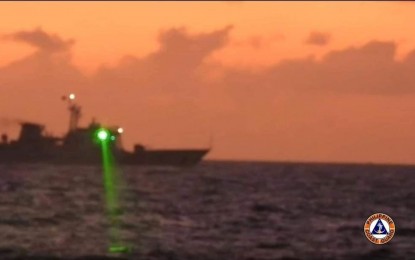
SUPPLY MISSION. A China Coast Guard vessel with bow number 5205 directed a military-grade laser light at the Philippine Coast Guard (PCG) vessel BRP Malapascua (MRRV-4403) while supporting a rotation and resupply mission of the Philippine Navy in Ayungin Shoal in the West Philippine Sea on Feb. 6, 2023. The Department of Foreign Affairs asked China to engage the Philippines based on “truth and goodwill”, citing a disconnect in their statements and what is actually happening in the West Philippine Sea days after the laser-pointing incident at the Ayungin Shoal. (Photo courtesy of the Philippine Coast Guard)
MANILA – The Department of Foreign Affairs (DFA) on Friday asked China to engage the Philippines based on “truth and goodwill”, citing a disconnect in their statements and what is actually happening in the West Philippine Sea days after the laser-pointing incident at the Ayungin Shoal.
In a Laging Handa briefing, Foreign Affairs spokesperson Ma. Teresita Daza said there seemed to be a “lack of congruence” between China's announcements and the actual events on the seas.
“We want to engage China as friends but as friends, we have to engage based on truth and goodwill. We have to have congruence with what is being said and what is being done in the waters and we want to actually build on the relationship, but this incident should not continue if we are to build on that,” she said.
Based on official government reports, a Chinese Coast Guard (CCG) vessel on Feb. 6 “shadowed” and pointed a military-grade laser towards the Philippine Coast Guard's patrol vessel BRP Malapascua, temporarily blinding its crew.
China defended this act as a response to what it called “intrusion” into Chinese waters and that the CCG's action was “professional and restrained”.
Daza refuted this, asserting that Ayungin Shoal is within the Philippines' exclusive economic zone (EEZ) and to direct a laser to a vessel “not just once but twice is not restrained in all accounts.”
“This is not in keeping with relevant rules and regulation on navigational safety not to mention the basic principles of professional seamanship and having endangering the BRP Malapascua and its crew,” she said.
“Hindi ito legal, hindi ito restrained, hindi ito propesyunal (This is not legal, this is not restrained, this is not professional),” she added.
The Ayungin Shoal is 105 nautical miles off Palawan province and over 600 nautical miles away from China.
Under UNCLOS, a coastal state has the “sovereign rights” to explore and exploit resources within its 200-nautical-mile exclusive economic zone.
Destabilizing
In the same interview, Daza reiterated that no less than President Ferdinand R. Marcos Jr. aired serious concerns about China’s “increasing frequency and intensity of action” in the West Philippine Sea.
She said these actions were not only damaging and dangerous but also “destabilizing” in terms of regional peace and stability.
As of Feb. 17, the DFA has lodged nine notes verbales and diplomatic protests against Beijing.
In an ANC interview on Friday, Australian Ambassador to the Philippines HK Yu also reiterated her support to Manila’s diplomatic action.
Australia together with the United States, Japan, the United Kingdom, Canada, Germany, and Denmark joined the Philippines in airing concern over the harassment incident.
Yu said China not recognizing the 2016 arbitral ruling that was based on the law of the sea itself is “a big problem.”
“[I]t is the United Nations Convention on Law of the Sea that provides us with clear guidance about what activities are allowed and what claims can be made,” she said. “We have to make sure that the international community makes it clear that UNCLOS provides that guidance and all parties should adhere toward and abide by the 2016 arbitral award." (PNA)
